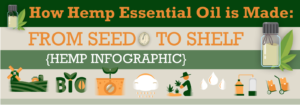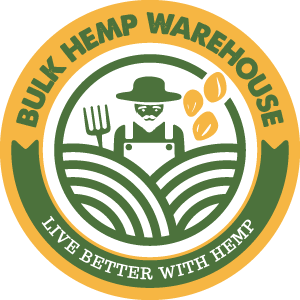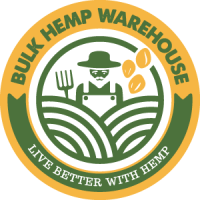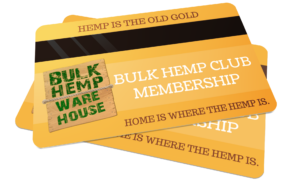

- Author Bulk Hemp Warehouse
- Categories: Hemp Benefits, Hemp Foods, Hemp Uses
Hemp Protein Benefits, Uses, Storage Recommendations & Nutritional Value
Use this page as a Guide to Hemp Protein & Navigate to where you need to get the hemp education you deserve.
Are you eating enough protein?
Those following restrictive diets, athletes, older adults, hospitalized patients, and those with certain medical conditions may struggle to consume enough protein.
Protein deficiencies can result in liver problems, hair loss, muscle loss, and stunted growth.
If you find it difficult to hit your protein targets, it might be time to look into alternative forms of protein.
Hemp is a very digestible source of protein that can be easily incorporated into your diet, with little to no allergy concerns.
Though revered by vegetarian and vegan communities, protein is not just for those on a plant-based diet. Read on to learn more about the benefits of hemp protein, and why it’s been used in Mediterranean or other cultures for thousands of years.
What is Hemp Protein?
Producers make hemp protein from the seeds of a Cannabis sativa plant. Because it doesn’t contain any THC, hemp protein is entirely non-psychoactive. Instead, it is an extremely nutritious seed or powder with many metabolism-boosting benefits.
Many farmers cultivate plants with strong stalk fibers to encourage ample seed production (commonly referred to as “hemp hearts”).
Because of its pleasant, nutty flavor, hemp is becoming an increasingly popular ingredient in baked goods, smoothies, and toppings.
Hemp protein is a popular choice of vegans and vegetarians due to its amino acid profile. Amino acids are organic compounds that form protein in the body.

The Benefits of Hemp Protein
If you’re already getting protein from other sources, why turn to hemp protein? The benefits speak for themselves.
1. It’s a Complete, Lean Protein Source
If you’re looking to incorporate more meatless protein options into your diet, this is the perfect supplement for you.
Because the seeds are low in fat but high in protein, they make an ideal companion to both an athletic lifestyle as well as one that is relatively sedentary.
When you eat lean protein, you’re promoting lean body mass, a healthy metabolism, and a happy digestive system. What’s not to love?
2. It’s Good for the Digestive System
Replacing a milk-based protein with hemp is kinder to your digestive system than the lactose found in dairy-based proteins.
Consuming hemp is much easier on the digestive tract and helps to avoid uncomfortable digestive disorders.
Due to high amounts of fiber, hemp protein also aids in the natural cleansing of the colon. It might also stave off hemorrhoids, diarrhea, constipation, and toxins lurking in your body.
3. Hemp Protein Is High In Minerals and Antioxidants
As humans increasingly consume more processed foods, they are missing out on essential minerals and antioxidants that are essential to important functions in the body.
Hemp contains high levels of your daily recommended consumption of phosphorus, potassium, sodium, magnesium, sulfur, calcium, iron, and zinc– all minerals that are better absorbed when eaten in the form of food.
4. It Boosts The Immune System
Edestin and albumin are globular proteins that help to create enzymes, antibodies, hormones, blood thickeners, and blood plasma.As hemp contains these globular proteins, increasing your consumption will help to support a waning immune system and keep away unnecessary illness.
5. It Promotes Heart Health
Want to increase your longevity and decrease your chance of heart-related ailments? When you combine dietary fiber, and fatty acids together, you’ve made yourself a cocktail of nutrients that fight heart disease.
Additionally, essential fatty acids play a huge role in regulating cholesterol levels. When cholesterol levels are regulated, your arteries are able to function without the risk of plaque blockage.
Hemp also naturally contains tocopherols–compounds that help to lower the risk of cardiovascular diseases. The combination of tocopherols and antioxidants make for a healthier heart.
6. It Improves Hair, Scalp, Skin and Nail Health
Essential fatty acids and Vitamin E work wonders for hair, scalp, skin, and hair health. With these properties combined, your skin remains moisturized and less itchy.
Nails become stronger, and hair becomes strong and shiny.
7. It Contains High Amounts of Omega Fatty Acids
Next to containing a high concentration of quality protein, hemp seeds, and hemp protein contain crucial omega fatty acids like omega-3 and omega-6.
Omega fatty acids are used in the body for detoxification, building brain cells, regulating sex hormones, building neurotransmitters, and resisting obesity through a healthy metabolism.
Hemp seeds are one of the few foods that contain gamma-linolenic acid (GLA)– an essential fatty acid with anti-inflammatory properties.
Those suffering from inflammatory joint conditions like arthritis and skin conditions like eczema can consume hemp and hemp protein knowing the anti-inflammatory benefits may help them manage their pain, discomfort and flare-up of symptoms.
8. It Can Be a Possible Remedy for Illness
Food truly is nature’s medicine. Some proponents of hemp protein stress its effectiveness in combating the following illnesses:
- Asthma
- Coughing and respiratory problems
- Bloating
- Arthritis
- Osteoporosis
- Syphilis
- Pneumonia
- Heart problems
- Urinary conditions
The insoluble fiber in hemp seeds has also been shown to lower one’s risk of diabetes Because of its superfood qualities, hemp protein eliminates deficiencies that may be at the root cause of disease. Enjoying the recommended daily serving can help!
9. Hemp is Rich in Crucial Amino Acids
Your body requires 22 amino acids in order to perform normal functions.
Once consumed, the body takes amino acids and converts them into protein. Because the body cannot create its own amino acids, it must source these compounds from food.
Most often, humans get the amino acids they need from animal products like milk, meat, and eggs. However, hemp is one of the few plant products that contain the amino acids needed to help repair muscle cells, regulate the nervous system, and regulate brain function– all without the need for consuming animal products!

How to Use Hemp Protein
Hemp protein uses vary from appetite control, muscle building, and nutrition during pregnancy. It’s an extremely dissolvable, healthy snack that pairs well with a healthy lifestyle.
Most hemp seed consumers eat one to four tablespoons per day, which is around 30 grams.
This tends to be in the form of a powder and is easily added to smoothies, hot cereal, pancakes, and bread mixes.
Hemp protein can also be used to replace 25 percent of the flour in baked goods.
This can change a recipe from a sweet snack to a nutritious meal complete with protein, fiber, healthy fats, and plenty of important micronutrients.
Nutritional Facts Hemp Protein
Hemp is a complete protein full of minerals, dietary fiber, essential fatty acids, and other nutritional components.
Here are the basic hemp protein nutritional facts to keep in mind for one serving of hemp seeds:
- Calories: 180
- Calories from Fat: 126
- Total Fat: 14.0g or 22%,
- Saturated Fat: 1.5g or 8%
- Polyunsaturated Fat: 10.0g
- Monounsaturated Fat: 1.5g
- Potassium: 300mg or 9%
- Total Carbohydrates: 2.0g or 1%
- Dietary Fiber: 2.0g or 8%
- Protein: 10.0g
- Vitamin A:: 0%
- Vitamin C: 0%
- Calcium: 2%
- Iron: 20%
Hemp is a major source of omega fatty acids, and offers a 3-to-1 ratio of omega-6 to omega-3 fatty acids. This is considered “optimal for heart and brain health.
One serving of hemp protein contains:
- 7.5 grams of Omega-6 fatty acids
- 3 grams of Omega-3
- 0.6 grams of Super Omega-6 Gamma Linolenic Acid (GLA)
- 0.3 g Super Omega-3 Stearidonic Acid (SDA)
Hemp meal or flour can vary in protein content, depending on how it’s milled. Always check the nutrition facts on your product of choice.
Hemp Protein Storage Tips
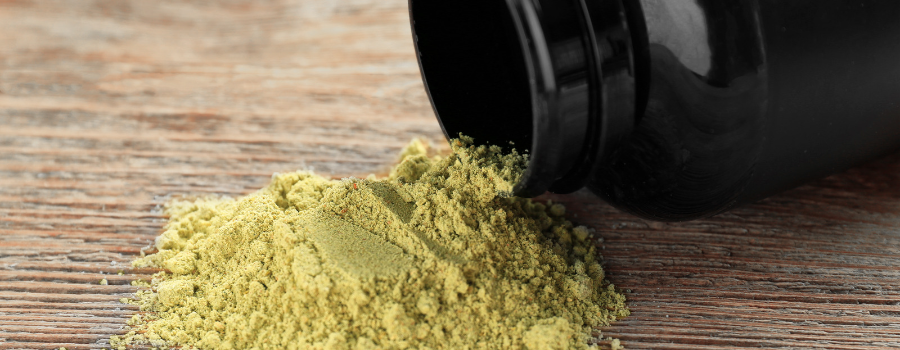
If you are planning to add hemp protein to your pantry, you might want to think again. Once you’ve opened your package, it’s important to keep the container sealed and cool in order to keep the fats in the hemp protein from going rancid.
Rancidity occurs in fat when it is exposed to light, oxygen, or heat. Once the fat breaks down under these conditions, they become small particles called fatty acids.
This oxidation will cause your hemp protein to change in color, give off a bad smell, and can be potentially harmful.
Rancid hemp protein will not be as nutritious as fresh hemp protein, as the good fats and vitamins are destroyed during oxidation.
For more information on storing hemp foods check out this resource here.
Where to Buy Bulk Hemp Protein
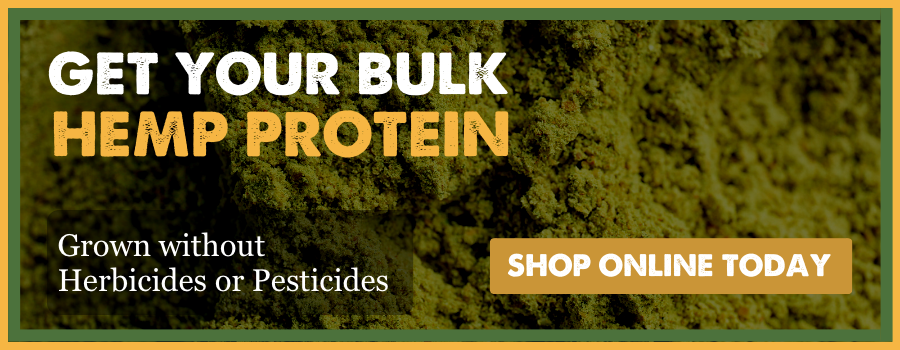
Why not choose a protein source with more healthy omega fats and fiber than anything else on the shelf? Hemp protein contains more of these essential nutritional components than other traditional protein powders, while also supporting the immune and adrenal systems.
It’s clean, and kinder to the environment – what’s not to love?
If you are an avid hemp protein consumer, it might be time to consider buying in bulk.
Or if you’re a raw food manufacturer, ingredient supplier, or require hemp protein for your health product, we have several quality hemp protein options to choose from.
Here’s were you can buy our Bulk Hemp Protein Options. Stock up on your protein of choice!
ADDITIONAL HEMP PROTEIN RESOURCES:
OTHER EDUCATIONAL HEMP POSTS
Explore Other Posts by Bulk Hemp Warehouse

Why Hemp Seeds Are the Ultimate Superfood for Birds – And Why Corn, Wheat, and Soy Don’t Belong in Their Diet
Could hemp seeds be the NEW Bird Feed that beats corn wheat and soy? I think so.
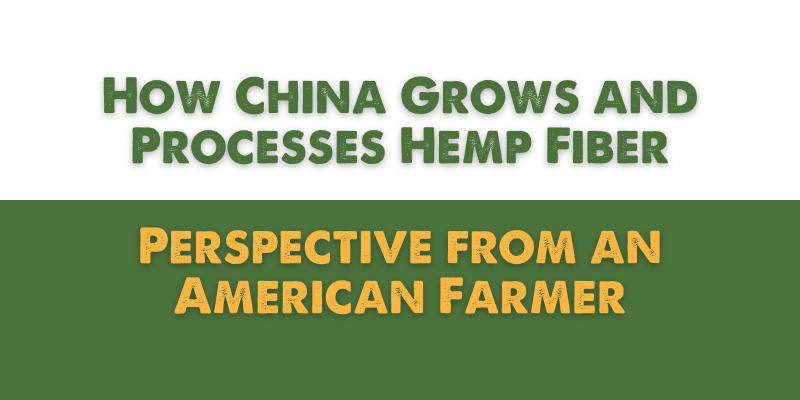
How China Grows and Processes Hemp Fiber – From an American Farmer
Steve Groff, a third-generation farmer from Southeastern Pennsylvania, recently embarked on a transformative journey to China, a trip that has profoundly impacted his perspective on the future of hemp farming and textile production. This wasn’t a casual tourist visit; it

10 Ways to Use Hemp for the Holidays
The holiday season is a time for creativity, warmth, and celebration. Hemp, with its versatility and sustainable nature, offers endless opportunities to make your holiday festivities more eco-friendly and unique. Whether you’re looking for gift ideas, decorations, or a way



